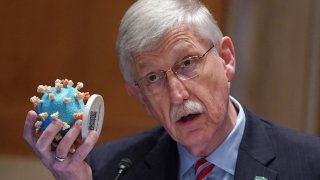
- Data from Israel on the effectiveness of Covid-19 vaccines over time is causing U.S. health leaders to rethink their position on vaccine booster shots in the U.S., NIH Director Dr. Francis Collins said Tuesday.
- Israel released new data Monday showing a reduction in the effectiveness of Pfizer's Covid vaccine against severe illness among people 65 and older who were fully vaccinated in January or February.
New data from Israel on the effectiveness of Covid-19 vaccines over time is causing U.S. health leaders to rethink their position on vaccine booster shots in the U.S., National Institutes of Health Director Dr. Francis Collins said Tuesday.
"The people who got immunized in January are the ones that are now having more breakthrough cases," Collins said during an interview on "The Hugh Hewitt Show," referring to Covid infections in fully vaccinated individuals. Israel released new data Monday showing a reduction in the effectiveness of Pfizer's Covid vaccine against severe illness among people 65 and older who were fully vaccinated in January or February.
We're making it easier for you to find stories that matter with our new newsletter — The 4Front. Sign up here and get news that is important for you to your inbox.
Collins said the rise in so-called breakthrough cases in Israel is likely due to a combination of the highly contagious delta variant and Covid vaccine protection waning over time.
"Mostly, of course, these are symptomatic, but not serious," he said. "But you're starting to see a little bit of a trend toward some of those requiring hospitalization."
Money Report
Collins' comments come as federal health officials are expected to recommend that most people in the U.S. who are eligible for Covid vaccinations should get booster shots eight months after their second doses.
The federal guidance, which would apply only to the two-shot Pfizer and Moderna vaccines, could go into effect as early as mid-September, pending FDA authorization, a person familiar with the discussions told CNBC.
The New York Times reported Monday that federal health officials are particularly concerned about data from Israel, where Covid vaccinations began ahead of many other countries. The data reportedly showed that for people vaccinated in January who are age 65 and older, the Pfizer vaccine was less than 55% effective against severe disease and hospitalization.
Collins said Tuesday that federal officials are starting to see the same thing in U.S. data.
"Although right now, it still as if our vaccine protection is working really well," he said. "But we don't want to wait until it's like oh, too late. So that's why we're looking at the data."
Up until now, federal officials haven't recommended booster doses for the general public. On Friday, they approved administering Covid booster shots of Pfizer's and Moderna's vaccines to Americans with weakened immune systems, which includes cancer and HIV patients and people who have had organ transplants.
Covid vaccine makers, including Pfizer and Moderna, have repeatedly contended that everyone will eventually need a booster shot and potentially extra doses every year, just like for the seasonal flu.
The NIH, Food and Drug Administration and the Centers for Disease Control and Prevention released a joint statement Tuesday saying they have a "rigorous process" to determine when boosters would be necessary.
"This process takes into account laboratory data, clinical trial data, and cohort data – which can include data from specific pharmaceutical companies, but does not rely on those data exclusively," the agencies said. "We continue to review any new data as it becomes available and will keep the public informed."
On Monday, Pfizer and BioNTech said they have submitted early stage clinical trial data to the FDA as part of their U.S. application seeking authorization of a Covid vaccine booster for everyone 16 and older. The companies said they would seek approval for a booster dose via a supplement to their application once the agency grants the vaccine full approval.
If the booster shots are approved, the U.S. would likely vaccinate nursing homes, health-care providers and the elderly first, Collins said Tuesday. He said "ideally" people should stick with the same manufacturer they got their first two doses from.
"But if for some reason you don't have access to it, well, then get the other one," he said. "Again, I'd feel more comfortable as a scientist fixing our plans on real data, and that means sticking to the same kind of vaccine that you got to begin with."
–CNBC's Tom Franck contributed to this report.






